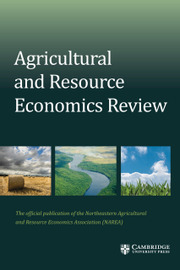Article contents
Control of Nonpoint Source Pollution Through Voluntary Incentive-Based Policies: An Application to Nitrate Contamination in New York
Published online by Cambridge University Press: 15 September 2016
Abstract
A voluntary program is developed to achieve environmental goals through the self-interested choices of farmers under environmental risk and asymmetric information. Farmers behave to maximize expected net returns, and environmental quality standards are formulated through chance constraints. Because the government may not know each farmer's soil type, policy options must be self-selecting. The model is applied empirically to nitrate leaching and runoff from corn production in three New York regions. Asymmetric information between producers and the government would impose additional cost burdens on society, but these costs are modest in the context of other farm programs.
- Type
- Articles
- Information
- Copyright
- Copyright © 2001 Northeastern Agricultural and Resource Economics Association
References
- 5
- Cited by


